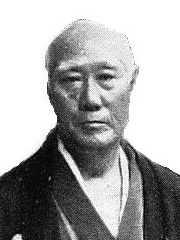Minoura Katsundo
Minoura Katsundo 箕浦 勝人 | |
|---|---|
 Minoura Katsundo in October 1927 | |
| Born | March 13, 1854 Usuki, Oita, Japan |
| Died | August 30, 1929 (aged 75) |
| Nationality | Japanese |
| Occupation(s) | journalist, politician, cabinet minister |
Template:Japanese name Minoura Katsundo (箕浦 勝人, 13 March 1854 – 30 August 1929) was a journalist, entrepreneur, politician and cabinet minister in the pre-war Empire of Japan.
Biography
Minoura was from Usuki, Bungo Province (present-day Oita Prefecture. He attended the Kieo Gijuku, (the predecessor to Keio University, where he was a disciple of Fukuzawa Yukichi. After graduation, he joined the Yubin Hochi Shimbun in 1875 as a reporter, and rose rapidly ranks to become president of the company in 1890. He was once jailed for an editorial supporting greater public rights.[1]
Joining the Rikken Kaishintō political party, he was elected to the House of Representatives of Japan in the 1890 General Election. While a member of the Diet of Japan, he was a driving force in attempts to reform the Press Law, and to remove censorship regulations and press bans, especially concerning political debates and issues. [2] His proposals were continually defeated, until a compromise bill was passed in 1897 allowing for reduced fines and punishments. [1] Minoura was vice-speaker of the House of Representatives from March 1904 to December 1908.
Minoura served in the 2nd Ōkuma Shigenobu administration as Minister of Communications from 1915-1916. However, his political career ended in a sensational political corruption case in 1926, when he was arrested along with a number of high-ranking members of government for accepted bribes from real estate companies in Osaka over the relocation of the Matsushima Brothels and incarcerated at Osaka Prison. Minoura had to this point been respected by the Japanese public for having no rumor of scandal attached to his name. After a highly publicized court trial, Minoura was found not guilty on 13 October 1927 and released.[3]
References
- ^ a b Huffman, James L (1995). Creating a Public: People and Press in Meiji Japan. ISBN 0824818822: University of Hawaii Press.
{{cite book}}: Cite has empty unknown parameter:|coauthors=(help)CS1 maint: location (link) page 262, 375 - ^ De Lange, William (1998). A History of Japanese Journalism: Japan's Press Club as the Last Obstacle to a Mature Press. ISBN 1873410689: Psychology Press.
{{cite book}}: Cite has empty unknown parameter:|coauthors=(help)CS1 maint: location (link) page 78 - ^ Mitchell, Richard H (1996). Political Bribery in Japan. ISBN 0824818199: University of Hawaii Press.
{{cite book}}: Cite has empty unknown parameter:|coauthors=(help)CS1 maint: location (link) page 46-49
External links
![]() Media related to Katsundo Minoura at Wikimedia Commons
Media related to Katsundo Minoura at Wikimedia Commons
